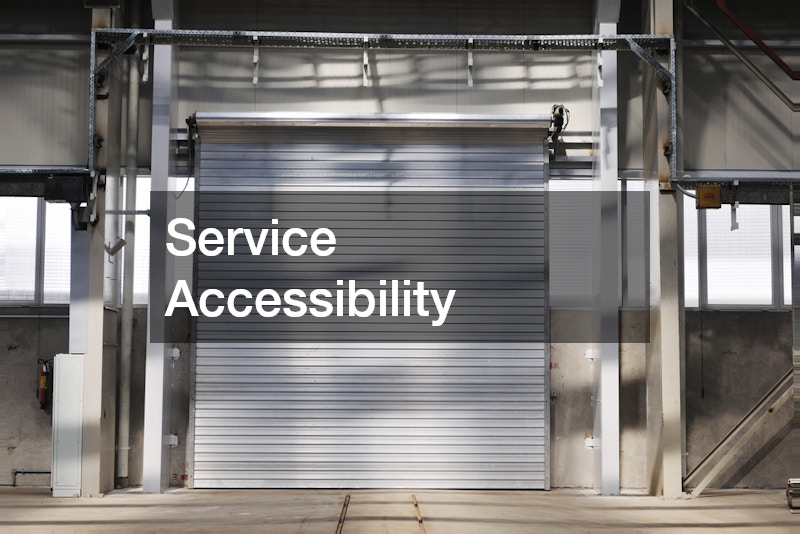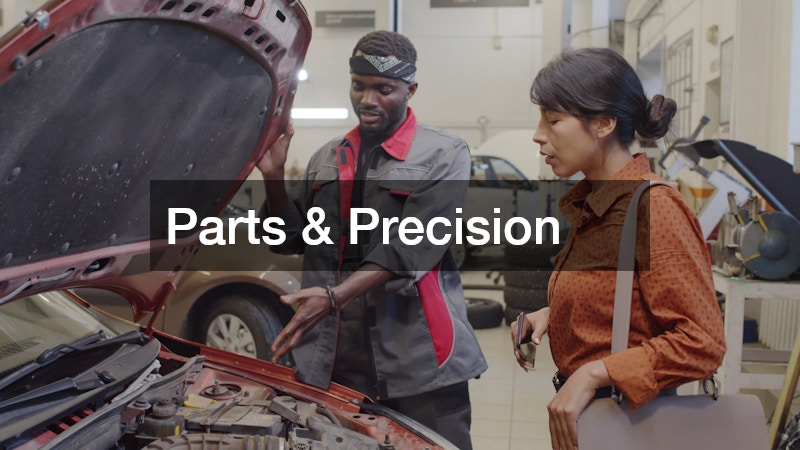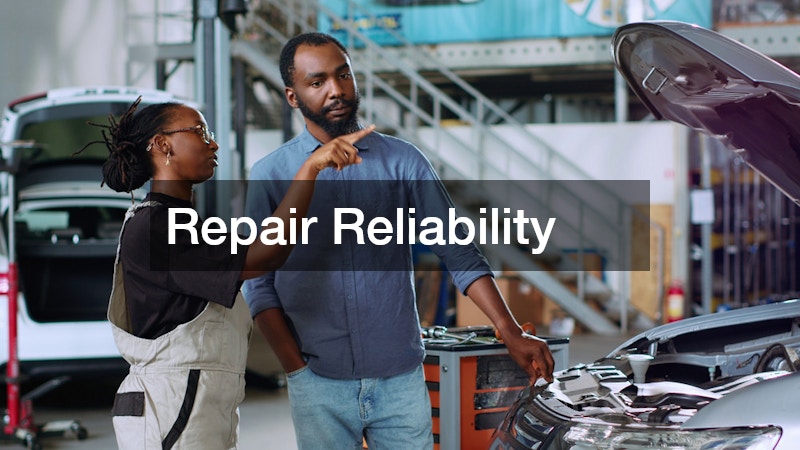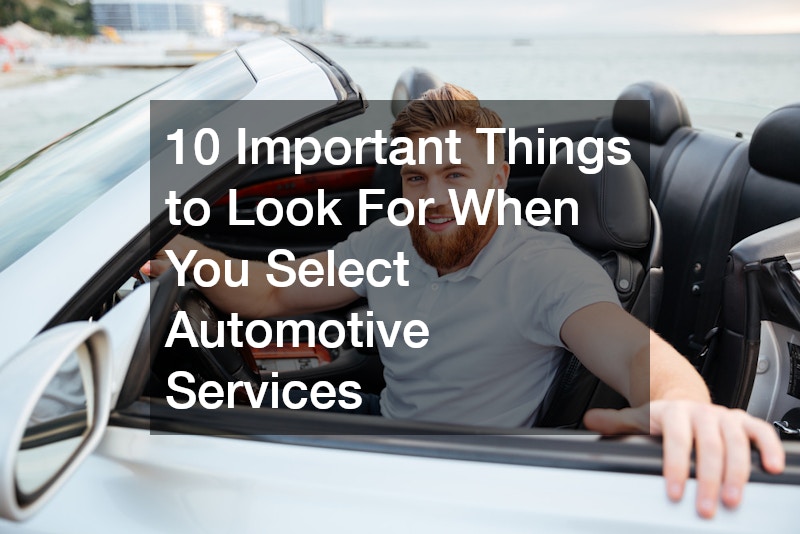When it comes time to select automotive services, the process can feel overwhelming given the range of options, providers, and specialties available. Whether you’re managing routine upkeep or dealing with an unexpected vehicle issue, making an informed decision requires more than just comparing prices. Quality, reliability, customer support, and long-term value all factor into the choices you’ll make. From preventative maintenance to emergency repairs, understanding what truly matters can help you build a relationship with a service provider who meets your standards—and keeps your vehicle running smoothly.
This article is designed to walk you through ten critical areas to evaluate before making any decisions. The goal is to help you understand which service aspects deserve extra attention and how each contributes to the health, safety, and performance of your vehicle. Some factors relate to the physical access and usability of the business, while others involve the technical capability or professionalism of the provider. You might also find yourself considering services or support systems that weren’t even on your radar before reading.
In the following sections, we’ll break down the details across ten relevant categories—from technological upgrades to legal considerations—offering insight into what to watch for and why it matters. By the end of this guide, you’ll be equipped with practical, real-world knowledge to confidently choose auto vendors that align with your vehicle’s needs and your standards. Whether you’re a first-time car owner or someone who’s had the same vehicle for years, this information can help guide your next decision with greater clarity and confidence. Let’s explore what to look for and how each element ties into the bigger picture of keeping your car safe, functional, and ready for the road.
1. Service Accessibility

Accessibility is a crucial but often overlooked factor when people choose service providers. It’s not just about proximity to your home or workplace—it’s also about how easy it is to physically enter and exit the facility. A well-designed shop should accommodate various vehicle sizes, provide ample space for parking, and ensure the premises are navigable, even during peak hours or bad weather.
For example, some automotive businesses are equipped with automatic or commercial-grade garage doors that allow larger vehicles or trailers to be serviced efficiently and safely. This becomes especially important for customers with oversized trucks, utility vehicles, or RVs, where traditional entryways might be too narrow or low. A shop with modern infrastructure signals professionalism and a capacity for diverse services.
When you choose car service vendors, checking for visible, operational, and customer-friendly entry points like updated garage doors can reveal a lot about the business’s investment in client experience. Ease of access can directly affect turnaround time, convenience, and even the safety of your visit. It also reflects a forward-thinking business that values client traffic and vehicle diversity.
2. Audio & Tech Fit
Today’s vehicles are equipped with increasingly complex technology, making it essential to select automotive services that understand both mechanical systems and digital integrations. From navigation units to Bluetooth connectivity, in-car technology plays a central role in driving comfort, entertainment, and communication.
If you’re interested in a car audio upgrade, it’s important to find a provider who not only sells the components but also understands proper installation without damaging internal wiring or voiding warranties. Not all mechanics are trained in audio system customization, so you’ll want a shop that specializes in both hardware and software compatibility.
When you pick a service provider for tech enhancements, ensure they offer diagnostic tools and qualified staff for electronics. A seamless integration of upgraded features not only improves your ride but also protects the electrical integrity of your car. The right provider will work with your vehicle’s existing system while elevating its performance and aesthetic.
3. Parts & Precision

Precision is non-negotiable when it comes to engine work and component replacement, and this is especially true for high-pressure, performance-critical parts. You need to choose someone who prioritizes accurate diagnostics and the use of high-quality parts that meet or exceed OEM standards.
Take valves, for example—an essential engine component responsible for regulating fuel and air intake and exhaust output. If improperly installed or calibrated, faulty valves can lead to engine misfires, decreased performance, or long-term mechanical damage. Servicing valves demands technical skill and exact measurements to ensure optimal engine timing and airflow.
When you select automotive services for internal engine repairs, confirm that the team has access to manufacturer specifications, precision tools, and diagnostic technology. A commitment to craftsmanship at this level not only improves your vehicle’s efficiency but can prevent future issues that might otherwise result in costly repairs or replacements.
4. Legal Preparedness
When you select automotive services, it’s easy to focus solely on mechanical needs, but it’s equally important to consider the legal aspects that can arise from vehicle use. Accidents, liability issues, and disputes over service quality or damage claims can bring legal complications, so being prepared on that front is wise. A well-rounded automotive strategy includes knowing what legal resources or affiliations a service provider might offer or recommend.
If an accident occurs and you’re unsure who’s liable—or if you’re dealing with injuries or insurance disagreements—you may need support from an accident lawyer. Some automotive service providers partner with legal professionals or can refer clients to reliable representation. These connections become crucial when navigating post-collision logistics, especially when technical reports or service records are relevant to a case.
To protect your interests, choose automotive providers that understand the value of legal preparedness. Whether through clear documentation, policy transparency, or access to professional referrals, such providers demonstrate a comprehensive approach to customer care. This level of diligence ensures you’re not left scrambling when the unexpected happens.
5. Repair Reliability

One of the most fundamental reasons people select automotive services is for routine and emergency repairs. While many shops advertise full-service capabilities, not all deliver consistent, long-lasting results. You need a provider known for diagnostic accuracy, timeliness, and the use of reputable replacement parts.
Whether it’s a simple brake job or an advanced transmission issue, choosing the right auto repair service can impact the lifespan and resale value of your car. Look for shops with certified technicians, warranty-backed work, and transparent pricing. It also helps if they maintain digital records so you can track your service history with ease.
When you choose a service provider for repairs, prioritize those with a reputation for getting it right the first time. Reliable service means fewer return visits, lower long-term costs, and greater peace of mind. Trustworthiness in repairs reflects a provider’s overall business integrity and commitment to your vehicle’s health.
6. Ownership Support
Vehicle ownership involves more than just maintenance; it includes legal documentation, transfer of ownership, and sometimes even estate planning. When you choose a vehicle provider, especially during a purchase, trade-in, or inheritance situation, it’s helpful to consider vendors that work seamlessly with professionals who handle vehicle titles and registration.
A title company plays a vital role in ensuring ownership is legally transferred and documented properly. Whether you’re buying a used car, selling one, or managing the affairs of a family member’s estate, having the right paperwork ensures your vehicle is legally yours. Some automotive service centers partner with or refer trusted title companies for added convenience.
By choosing to select automotive services that offer guidance on or connections to title companies, you’re streamlining what could otherwise be a frustrating, paperwork-heavy process. This saves time, reduces the chance of clerical errors, and protects you from potential legal or tax issues related to improper documentation.
7. Hauling Solutions

For those who haul equipment, recreational vehicles, or materials, it’s important to choose service providers that understand the complexities of towing and transport. The demands on vehicles that regularly pull trailers are far different from the average daily driver, so service providers should be equipped to handle that added strain.
Partnering with a trailer dealer is a smart move if you’re in the market for a new trailer or need custom hauling solutions. These dealers can help you select the right type, weight class, and features to match your towing vehicle and intended use. More importantly, a well-connected automotive service provider can coordinate with trailer experts to ensure compatibility and a safe setup.
When you choose experienced vendors, you ensure every component—tow hitch, wiring, braking systems, and more—is correctly installed and maintained. This not only protects your vehicle but also enhances safety for others on the road. It’s a layer of service that can save you money and trouble in the long run.
8. Emergency Help
Breakdowns and accidents don’t follow a schedule, which is why choosing to select automotive services with reliable emergency support is essential. Whether you’re stranded on the side of the road or facing a mechanical failure in your driveway, access to fast, efficient help is a key part of modern vehicle ownership.
Strong relationships with towing companies can make a big difference. Look for service providers who partner with reputable local towing operators or offer in-house assistance. This ensures you’re not left scrambling for help during high-stress situations and can expedite the path toward getting your vehicle back on the road.
When you pick a vendor that prioritizes emergency readiness, you’re investing in peace of mind. A trusted towing partner reflects a service provider’s commitment to customer support beyond their shop doors. Their reliability isn’t limited to routine hours or controlled settings.
9. Luxury Car Needs
Luxury vehicles require specialized care, and it’s important to choose a provider that offers the right training, tools, and manufacturer-specific knowledge. From proprietary diagnostic systems to unique part specifications, higher-end cars operate under stricter service guidelines that general shops may not be able to meet.
BMW maintenance, for instance, involves more than oil changes—it often includes software updates, specialized brake systems, and precision-engineered performance tuning. Entrusting your vehicle to an inexperienced shop can result in voided warranties or overlooked issues. That’s why service history, factory certifications, and access to OEM parts should be non-negotiable.
When you select automotive services for a luxury brand, verify that they’re approved or familiar with your specific make. This ensures that the investment you’ve made in your vehicle is matched by the care it receives. Specialized maintenance not only protects your car’s value but also optimizes its performance, safety, and longevity.
10. Rust Prevention
Long-term vehicle protection is often about what you don’t see. It’s important to look beyond surface-level needs and consider treatments that protect your car from environmental threats like rust. This is especially critical in regions with snow, road salt, or high humidity.
One of the most effective ways to prevent rust is through undercoating. This service involves applying a protective layer to the underside of your vehicle, creating a barrier against moisture, salt, and debris. While it’s commonly recommended for trucks and off-road vehicles, this extra layer of defense benefits any car facing harsh conditions.
When you choose providers that offer undercoating, you’re investing in the longevity of your vehicle’s frame and components. It’s a proactive step that reduces corrosion-related repairs, maintains structural integrity, and can even support resale value. A service provider that offers this shows a commitment to preserving your vehicle, not just fixing it when things go wrong.
Choosing What’s Right for You
Navigating the world of vehicle care can be challenging, especially with so many specialties and providers competing for your business. That’s why it’s essential to approach the process thoughtfully and prioritize quality, reliability, and forward-thinking support. As this guide illustrates, when you choose a vendor for your vehicle, it’s not just about fixing a single issue—it’s about aligning yourself with professionals who understand the full scope of vehicle ownership.
From ensuring easy service access and technology upgrades to having legal support and emergency assistance in place, each element adds to the overall experience and protection of your investment. Whether your needs are routine or highly specialized, choosing service providers who excel in their niche while keeping the bigger picture in mind can make all the difference.
By considering options such as trailer readiness, rust prevention, or even ownership documentation support, you position yourself for a smoother ride, literally and figuratively. Choosing well means fewer breakdowns, smarter spending, and a stronger sense of confidence every time you get behind the wheel. So as you move forward, keep this checklist in mind. It will help you select automotive services that are not only competent but also truly committed to keeping you on the road safely and effectively.

